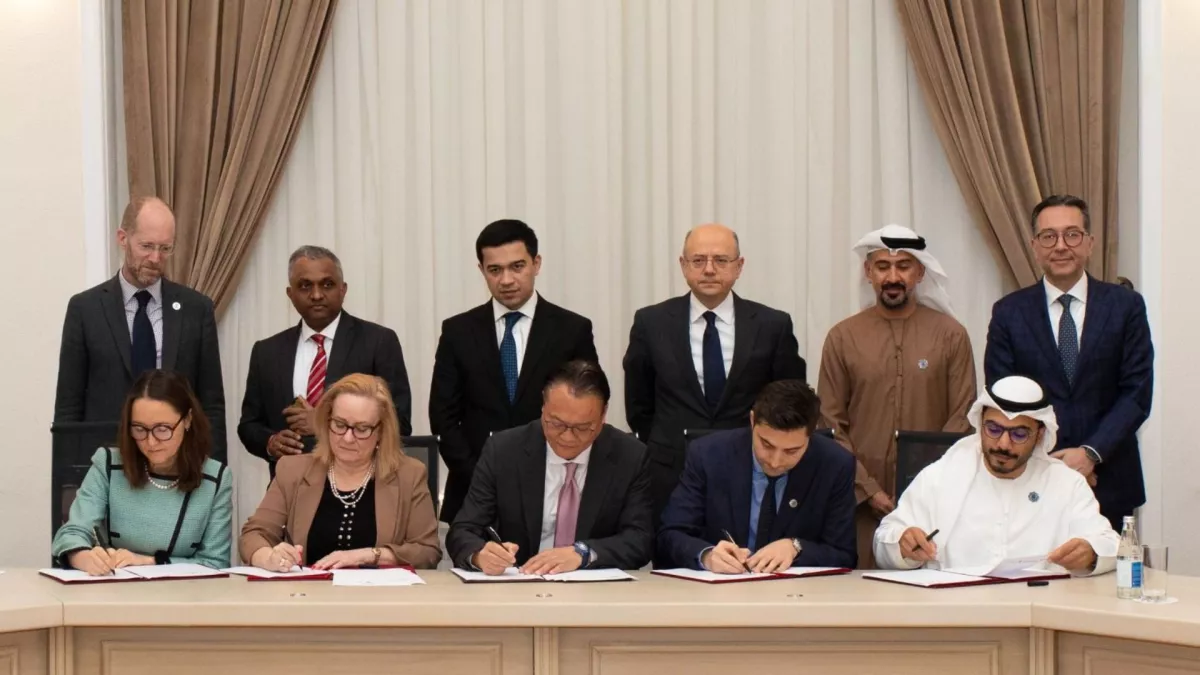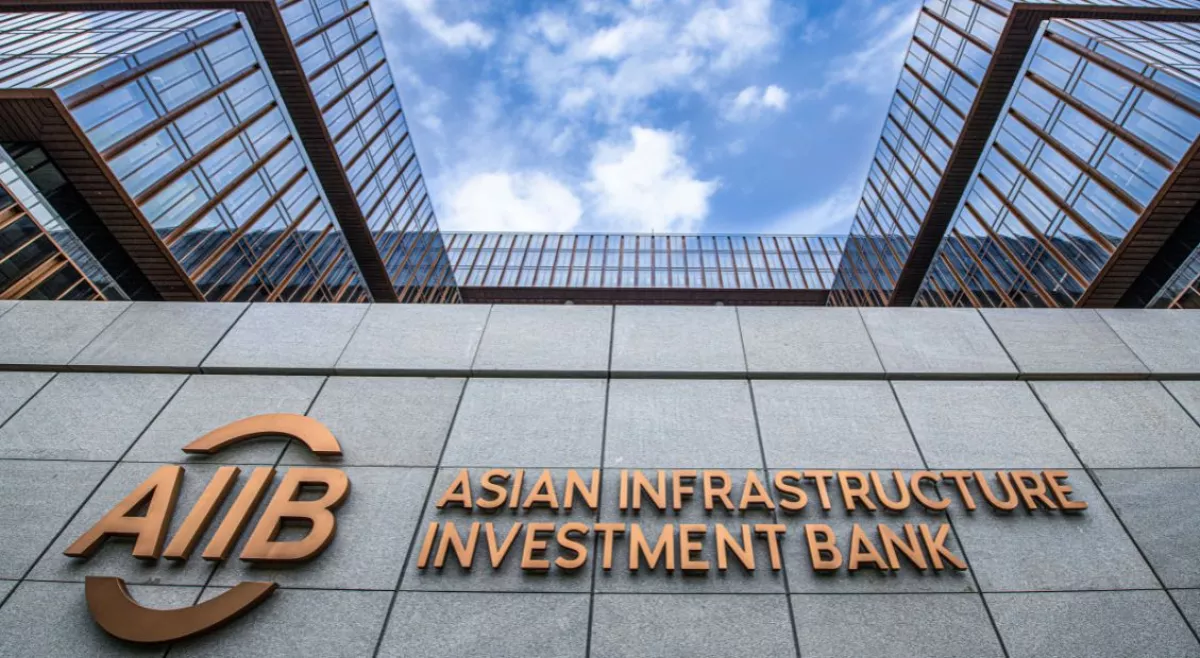COP29: AIIB’s “solar” contribution to Azerbaijan’s energy sector Caliber.Az review
Azerbaijan’s economic stability, its prominent role as a key energy and transport hub in the Caspian region, and its leadership in green transformation in the South Caucasus have long drawn the attention of international financial institutions. One such institution, the Asian Infrastructure Investment Bank (AIIB), has been successfully collaborating with the country since 2016. Recently, during the ongoing UN Climate Conference in Baku, an agreement was signed to finance the construction of solar power plants (SPPs). However, AIIB’s involvement in Azerbaijan goes beyond green energy, encompassing sectors such as transport, logistics, industry, digitalization, and other areas of the economy.
In recent years, Azerbaijan has consistently implemented advanced international practices for the development of renewable energy sources (RES) and has made efforts to build a green economy. Azerbaijan’s initiatives in this area are actively supported by international financial institutions (IFIs), including the World Bank, the Asian and Islamic Development Banks, the European Bank for Reconstruction and Development (EBRD), and others.
During the ongoing UN Climate Conference in Baku, agreements were signed with several international donor organizations to fund projects focused on green energy generation and environmental initiatives. Notably, at COP29, the Asian Infrastructure Investment Bank (AIIB) signed an agreement to finance its first renewable energy project in Azerbaijan with private capital. The project involves the financing, development, construction, operation, and maintenance of two solar power plants—Banka Solar (315 MW) and Bilasuvar Solar SPV (445 MW)—with a total investment of $160 million.
The project is being led by the UAE-based Abu Dhabi Future Energy Company PJSC (Masdar) in partnership with Azerbaijan's SOCAR Green. Co-financing partners include the Asian Development Bank (ADB) and the European Bank for Reconstruction and Development (EBRD). Once operational, the solar plants are expected to generate clean and affordable electricity, reduce greenhouse gas emissions by approximately 757,000 tons of CO2 equivalent annually, and create new local jobs.

This initiative marks AIIB’s first renewable energy project in Azerbaijan and, importantly, the financing is provided as an unsecured sovereign-guaranteed loan. This underscores the bank's commitment to diversifying its portfolio and strengthening renewable infrastructure in the country. The project underwent a thorough climate risk assessment to ensure alignment with the Paris Agreement and Azerbaijan's National Adaptation Plan, fully meeting the criteria for climate adaptation financing. Overall, the agreement aligns with the thematic priorities for developing green infrastructure, as well as the corporate and energy strategies of the Asian Infrastructure Investment Bank.
"This project reaffirms AIIB’s commitment to supporting Azerbaijan’s ambitious energy transition and contributes to the development of energy infrastructure resilience and the achievement of the country’s climate goals," said Najeeb Haider, AIIB’s Director General for Projects and Corporate Finance. "The investment in this project highlights the bank's dedication to mobilizing private capital to expand the renewable energy project portfolio and ensure a sustainable future for Azerbaijan and the broader region."
The Asian Infrastructure Investment Bank (AIIB) began operations in January 2016, with its headquarters located in Beijing. Over the past eight years, the bank's membership has grown to 57 countries, and its capitalization stands at $100 billion. The bank has also received AAA ratings from the world’s leading credit rating agencies. At the same time, AIIB is aiming to increase private sector participation, to achieve 50% of its funding from private sector sources by 2030.
The bank's core mission focuses on financing infrastructure projects across Asia and beyond, in sectors such as transportation, telecommunications, water supply, green energy, environmental sustainability, and the implementation of advanced technologies. The bank places particular emphasis on supporting regional development, steering infrastructure projects toward regional integration by expanding cross-border connections, trade, and transport initiatives. According to the bank's projections, by 2030, projects related to cross-border connectivity will account for 25–30% of its entire investment portfolio.
Another key priority for the bank is the development of the climate bond market. "We are actively developing the climate bond market in Asia, and our first issuance of climate adaptation bonds raised over $323 million to finance sustainable infrastructure," said Jin Liqun, President and Chairman of the AIIB, during a roundtable organized in Baku at COP29 on the topic Driving Transformative Climate Action: Shifting the Focus from Financial Inputs to Impact and MDBs' Catalytic Effect. "At the same time, we are creating climate funds and venture capital initiatives to accelerate the climate transition and foster the development of climate technologies."
Overall, over the past period, AIIB has become a significant player in infrastructure financing, approving more than 280 projects totalling $55 billion across 37 countries. The bank actively collaborates with its partners in Central Asia and the South Caucasus, and to date, AIIB has financed seven projects in the South Caucasus, covering sectors such as energy and transportation, with a focus on sustainable infrastructure to support long-term growth and regional resilience.

"Since the beginning of its operations, the bank has invested more than $5.5 billion in Central Asia and the South Caucasus, approving projects in countries such as Uzbekistan, Kazakhstan, Tajikistan, Kyrgyzstan, Azerbaijan, and other countries in the Caucasus. In these regions, we also plan new projects totalling around $4.5 billion," said Konstantin Limitovskiy, AIIB's Vice President for Investment Clients in the region and Project Financing, in an interview with local media. "The bank’s cooperation with Azerbaijan began in the first year of our operations, and we support the country’s development goals outlined in the 'Azerbaijan 2030' strategy, which focuses on sustainable and competitive growth. Our key areas of collaboration are transportation, energy, and urban development, as these priorities contribute to economic diversification and long-term sustainability."
One of the first and key projects in Azerbaijan was the financing of the Trans-Anatolian Natural Gas Pipeline (TANAP) in 2016 through AIIB. This project strengthened regional energy security and provided significant support to Türkiye and Europe during the 2022 energy crisis. As it continues to develop the energy sector, AIIB is contributing to the green transition in Azerbaijan. In addition to the recent agreements signed at COP29, the bank plans to finance the construction of additional solar and wind power generation facilities in the country.
Looking ahead, the Asian Infrastructure Investment Bank aims for closer collaboration with the government of Azerbaijan, other multilateral development banks, and private sector partners in key infrastructure development areas, such as cross-border transportation, urban development, renewable energy, electricity transmission, and more.








